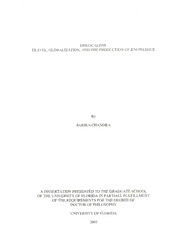Table Of ContentDISLOCALISM:
TRAVEL,GLOBALIZATION,ANDTHEPRODUCTIONOPKNOWLEDGE
By
SARIKACHANDRA
ADISSERTATIONPRESENTEDTOTHEGRADUATESCHOOL
OFTHEUNIVERSITYOFFLORIDAINPARTIALLFULFILLMENT
OFTHEREQUIREMENTSFORTHEDEGREEOF
DOCTOROFPHILOSOPHY
UNIVERSITYOFFLORIDA
2003
Copyright2003
By
SarikaChandra
TABLEOFCONTENTS
Page
ABSTRACT v
INTRODUCTION 1
CHAPTER
1 GLOBALIZATIONANDDISCIPLINARYPRACTICES 12
NewWorldOrder? 12
Dislocalism 17
DisciplinaryPractices 23
2 (IM)MIGRATION:PRODUCINGANATIONALISTLITERATUREINTHE“AGE
OFGLOBALIZATION” 53
SurvivalofNationalistParadigms 53
ImmigrationasaDislocalizingConcept 57
DislocalistPracticesinLiteraryCriticism 76
JuliaAlvarez’sHowtheGarciaGirlsLostTheirAccents 77
JessicaHagedorn’sDogeaters 95
EsmeraldaSantiago’sWhenIwasPuertoRicanandAmerica'sDream 116
Conclusion 133
3 RE-DRAWINGTHEBOUNDARIES:AMERICANTRAVELWRITING 135
TheEndofTravel? 135
RobertKaplan: “Actual”TravelsandFirstHandAccounts 146
MaryMorris:InterruptionofDomesticity 159
PaulTheroux:ThePoliticsofFiction 171
Conclusion 185
4 TOURISMTHROUGHFOOD 186
TheEnd(s)ofAuthenticity 192
FillingtheGaporNarratingtheNation 199
Fusion:Food&Wine 218
TheEnd(s)ofCuisineandACook’sTour 236
Conclusion 249
iii
5 CONCLUSION 250
REFERENCES 257
BIOGRAPHICALSKETCH 274
IV
AbstractofDissertationPresentedtotheGraduateSchooloftheUniversityofFloridain
PartialFulfillmentoftheRequirementsfortheDegreeofDoctorofPhilosophy
DISLOCALISM:
TRAVEL,GLOBALIZATION,ANDTHEPRODUCTIONOFKNOWLEDGE
By
SarikaChandra
December2003
Chair:SusanHegeman
MajorDepartment:English
ThisdissertationtakesacriticallookathowscholarshipinAmericanliterature,
especiallyethnic,literaryandculturalstudies,contendswiththeideaofglobalization. I
addresswhatitmeanstoarticulatenationally,regionally,ethnieally,andracially
distinctiveAmericanpracticesandidentitiesinthecontextofglobalizationand
Americanization. Accordingtotheconventionalview,globalizationhasusheredina
new“global”realitythatrequireseveryone,onpainofbecomingobsolete,tocatchup
andadapt. Inthecaseofliteraryandculturalcriticism,thisnew“global”anxietyhas
produeedwhatappeartobesweepingchangesinboththeunderlyingconceptionsof,and
thedisciplinaryapproachesto,an“American”literaryandculturalcorpus,andhasgiven
risetoparadigmsemphasizingtransnational“bordercrossing”and“migrancy.” Butare
thesechangesassweepingastheyseem? Mydissertationexaminesresponsesto
globalizationingenressuchasAmericanimmigrantliterarystudies,travelwriting,and
touristnarratives.Forinstance,Ilookattheconjunctionofliterarytextsbyeontemporary
V
writerssuchasJuliaAlvarez,JessicaHagedorn,andPaulTherouxwithnew
genresofscholarshipandpedagogyinordertouncoverthewaythatnationalist
paradigmspersistinthefaceofglobalization.
Iamparticularlyattentivetotheprocesswherebysuchgenres,ratherthanmerely
—
respondingtoforcesofglobalization,alsoparticipateinitsproduction for,Iargue,
globalizationisasmuchadiscourseasitisasetofhistoricalprocesses. Icallthis
discourse“globalism.” Iamalsointerestedinthedrivetoshoreupexistingand
traditionaldisciplinaryboundarieswithinAmericanliterarystudiesinresponsetothe
anxietiesproducedbyglobalization. BydeployingastrategyIrefertoas“dislocalism,”
literaryauthors,critics,andculturalproducersbothdisplaceandconsolidatetheir
practicessothatolderinstitutionalpracticesarenotentirelydisplacedorrendereduseless
inthecontextofglobalization. Finally,Ishowthatinthecontextofglobalization,
Americanimmigrantliterarystudies,travelwriting,andtouristnarrativesbecomesites
forthecontainmentofethnicityanddiversitywithinU.S.borders,thussecuringtheU.S.
asaplacethatisbothlocalandglobal.
VI
INTRODUCTION
Istartedundergraduateschoolwiththeintentionofstudyingbusinessand
pursuingafinanciallylucrativecareer,sowhenasmallbusinessschoolinMassachusetts
withanimpressivejobplacementrateofabout95%cameupwithanequallyimpressive
financialpackage,Ididn’thesitatetoaccept. Butafteraboutayearorso,Ifoundmyself
gravitatingtowardsliterarystudies,inpartbecausetheEnglishdepartmentseemedtobe
theonlyspacewithinwhichitwaspossibletocritiqueboththedisciplinesandthe
generalatmosphereofcollege,aswellastoquestiontheverysocialandeconomic
premisesforstudyingaccounting,finance,management,andsoforth. Butdespitethis
opennesstocritique,everyoneinEnglishseemedalsotobetacitlyagreedthat,giventhe
tightjobmarket,itwasnotinthebestinterestofthedisciplineofEnglishorthatof
studentsthattheybeencouragedtostudyliterature. SoIjoinedacombinedBA/MBA
program,pursuingEnglishasanundergraduatemajoranddeferringbusinessforgraduate
school.
TenyearsagowhenIcommencedmystudiesfortheMBAdegree,theprogram
wasgoingthrougharapidrestructuring,movingfromtheoreticallyKeynesian-based
disciplinarystudiesofmanagement,marketing,financeandaccountingtoamore
globallyorientedmodelthatwasinterdisciplinary,creatingformationssuchas
internationalbusiness—inwhichcourseslikemanagementtheorywouldbetaughtby
facultyfrommanydifferentdisciplines—completewithanaggressiverenewalofstudy
abroadcourses. Theroleofthehumanitiesasaservicetobusinessdisciplinesbecame
2
evenmorepronouncedandwentbeyonddepartmentssuchasEnglishandmodern
languageswiththeideaofhelpingthestudentsaccumulatethecommunicationand
writingskillsneededforentrepreneurship. Therhetoricoflearningabout“other”
culturesandacquiring“other”languageswasbeingvigorouslyemphasizedinthewake
ofanincreasinglyinterlinkedeconomy. Theadministrationaskedthehumanitiesand
socialsciencedepartmentstoprovidesuchlearningandyetatthesametimekeptsuch
departmentsfromexpandingwiththeexcusethatrecruitingmorehumanities/social
sciencesstudentswouldmakethecollegeloseitsidentityanditsnicheasanappealing
schoolforbusinessstudents.
ThoughafewpeopleintheEnglishdepartmenthadmovedintoteachinggraduate
coursesinmanagerialcommunicationortechnicalwriting,Istillhadasensethatthe
Englishdepartmentwasaplaceofcritiqueandarefugefrombusinessideology. Going
throughtheMBAprogram—allthewhilecontestingassignments,refutingquestionsand
challengingideology-itbecamecleartomethatIneededtoseekoutandstaywithinthis
refuge. SowhenIfinallyleftmycollegeforgraduatestudyinEnglish,Igleefullygave
awayorthrewawaymybusinesstextbooks,thinkingthatIwouldneverlookback. Fora
while,inmypursuitofEnglishgraduatedegreesatlargeruniversities,wheremembersof
Englishdepartmentsdidnotnecessarilyhavetoengagewiththerhetoricofbusinessona
dailybasis,IfoundincoursesonAmericanliterature,film,andethnicstudiesastillsafer
refugefromwithinwhichtocarryoutcriticalinquiry—sometimesdirectedatcorporate
—
interests togetherwithlike-mindedpeople.
ButwhenIbegantheworkofconceivingthisprojectacoupleofyearsago,it
becamecleartomethatIcouldnotfinallyleavebehindthinkingaboutthekindsof
3
discourseproducedbythebusinessdepartments. Theattentionto“globalization”hadby
nowbecomesopervasivethatnotonlyhadthebusinessdepartmentsdonetheworkof
shiftingtheirfieldimaginarybutliterary/culturalcriticshadbeenbusyshiftingtheirown
fieldsinrelationshiptoglobalizationaswell.
Globalizationhasnowfullyemergedasasubjectofmanysignificantacademic
studies. RecentpublicationssuchasSpacesofHope(2000)byDavidHarveyand
CulturesofGlobalization(1998),editedbyFredricJamesonandMasaoMiyoshihave
attractedconsiderableattentionforattemptingtodefinetheprocessesofglobalization.
ThesestudiesfromMarxistscholarsemphasizethatglobalizingforcesincreasethe
unevennessinthewaycapitalspreadsandretractsitselfacrosstheworld. Writingfroma
positionofrealpolitik,otherwriters,suchasFernandoHenriqueCardoso(Chartinga
NewCourse: ThePoliticsofGlobalizationandSocialTransformation,2001),and
RobertReich(TheWorkofNations:PreparingOurselvesforTwenty-firstCentury
Capitalism,1991),presentglobalizationasanewandinevitableconditionthatrequires
participationfromeveryone. Consequentlytheyhelpgeneratetheimpressionthatinthis
neweraolderpracticesarebecomingobsolete.Theyalsohelptoproduceanxietyby
suggestingthatentireinstitutionscanberenderedineffectiveiftheydonotproducework
usefulinthecontextofglobalization.Suchtheorieshavemadeitincreasinglydifficultto
ignorethequestionsofpolitics,economics,finance,andinformationtechnologyinthe
“culturedisciplines”suchasEnglish,history,andanthropology.
Giventhisturninliterary/culturalstudies,myquestionsinthiscriticalstudy
becomethefollowingones:Doestheprominentpositionofeconomicsandtechnologyin
thediscourseofglobalizationnecessarilymeanthatmembersofthosedisciplinesthat
—
4
understandtheworkingsoffinancecapitalism,internettechnology,andinvestmentare
theprincipalactors,orinterpreters? Arethoseinotherdisciplinessimplylefttocontend
withtheconsequencesoftheseeconomicandtechnologicalstrategies? Workincultural
theoryforthemostpartshowshowglobalizationaffectsourliteraryandculturaltexts
novels,television,films,andevenourculturallives. Inthisproject,however,Idonotso
muchanalyzehowglobalizationaffectsculturaltexts,butratherexaminehowthesetexts
— —
engagewith and,ineffect,participatein theoriesofglobalization. ForIarguethat,in
additiontobeingasetofhistoricalprocesses,globalizationisalsoadiscourse.
—
Indeed,Iproposethatculturalandliterarytheoryisnotnecessarily asitoften
—
seesitself compelledtotakeupglobalizationasasubjectpassivelybutthatitisactively
andsignificantlycontributingtotheproductionofglobalizationasadiscourse. Further,I
contendthattheconceptofcultureisjustasimportanttothedisciplinesoffinanceand
marketingastheworkingsofthestockmarketandthepoliticsofsellingproductsina
foreignmarketarebecomingtoculturaltheory. Iftheinevitabilityofengagingwith
finance,corporateculture,andtechnologyseemstobeasignalofglobalization,say,in
thedisciplineofEnglish,thentheinevitabilityofcultureis,inturn,amarkof
globalizationforthedisciplineofmarketing. Thefirstchapterofmydissertation
examinestheimplicationsof(inter)disciplinarypracticesasliterary/culturalstudiesturns
—
itsattentiontobusinessandcorporatepracticesandbusinessdisciplines specifically
— —
management lookpreciselytowardsconceptsofliteratureandculture bothofthem
doingsoinorderto“respond”tothecallofproducing“new”workinthecontextof
globalizationandtherebyatthesametimere-consolidatetheirowndisciplinarypractices.

